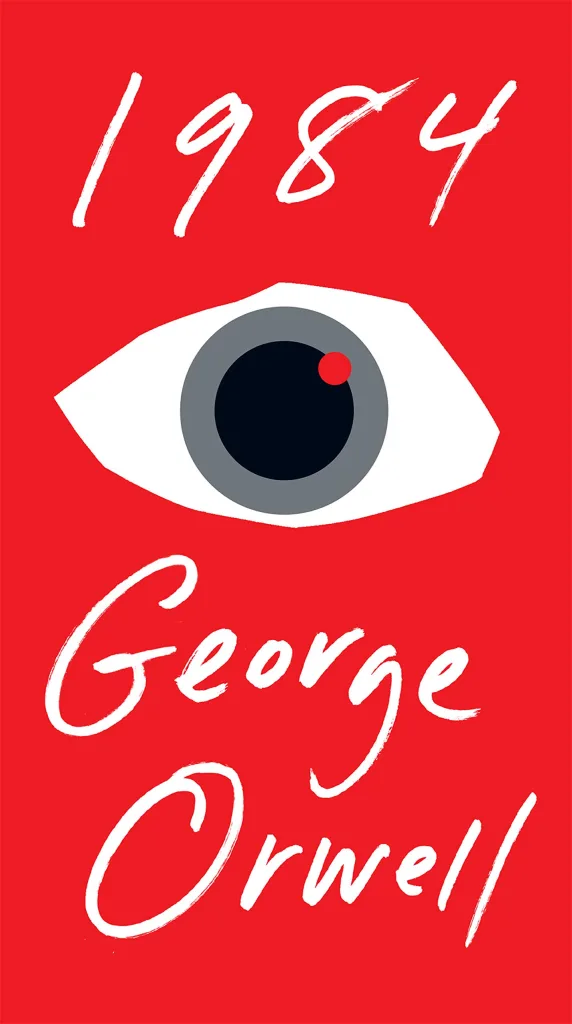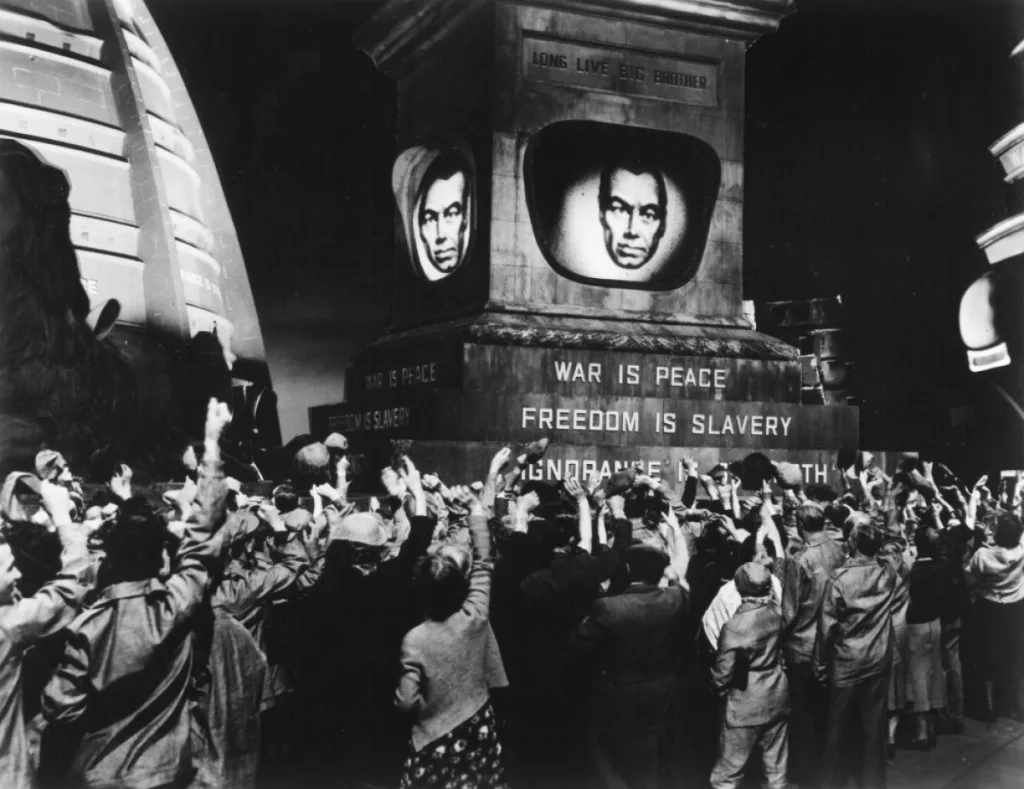In George Orwell’s dystopian novel, “1984,” the term “proles” refers to the working class of society, commonly known as the proletariat. These individuals make up a significant portion of the population in the totalitarian state of Oceania, comprising approximately 85% of its inhabitants.
Unlike the members of the ruling Party, who are constantly monitored and controlled, the proles enjoy a certain level of freedom and autonomy. They are not subjected to the strict surveillance and manipulation that the Party imposes on its members. The proles live in the impoverished neighborhoods of Oceania, engaging in manual labor and various menial jobs to sustain their livelihoods.
Winston Smith, the protagonist of the novel, holds a particular fascination with the proles. He sees them as a potential source of hope and rebellion against the Party’s oppressive regime. Winston believes that the proles, due to their sheer numbers and their relative independence from Party influence, possess the ability to overthrow the ruling class and bring about a revolution.
The prole woman, whom Winston encounters in the novel, symbolizes fertility and vitality. Orwell describes her as an animal, a mare, highlighting her strong and robust nature. By comparing her to a fruit (a rose-hip) and an overripe turnip, the author emphasizes her potential for growth and reproduction. She represents the resilience and strength of the lower classes, who, despite their oppressed state, have the capacity to challenge and resist the Party’s control.
However, it is important to note that while Winston places his hopes in the proles, the novel does not explicitly confirm whether they are capable or willing to rise up against the Party. Orwell leaves this possibility open-ended, allowing the reader to draw their own conclusions about the role and potential of the proles in the struggle for liberation.
The proles in George Orwell’s “1984” are the working class of Oceania, comprising 85% of the population. They live in poverty-stricken neighborhoods and are relatively free from Party surveillance and control. Winston sees the proles as a potential source of hope and rebellion against the oppressive regime. The prole woman symbolizes fertility and strength, representing the potential for the lower classes to challenge the ruling Party. However, the novel remains open-ended regarding their actual role in bringing about change.
What Kind Of People Are The Proles?
The term “proles” refers to individuals who belong to the working class, typically engaged in manual labor or industrial jobs. Proles are commonly associated with blue-collar workers, such as those employed in mills, factories, construction sites, and similar occupations. The concept of proles originated from Marxist economics and is derived from the word “proletariat,” which represents the collective working class.
To provide a more detailed understanding, here are some key characteristics of the proles:
1. Occupation: Proles are primarily engaged in physical labor and often work in industries that involve manufacturing, production, or construction. They may perform tasks such as operating machinery, assembling products, or performing manual labor-intensive work.
2. Economic status: Proles usually occupy lower socioeconomic positions and typically earn modest wages. Their income levels are often lower compared to those in higher skilled or more specialized professions.
3. Education: Proles may have limited access to higher education or professional training. While many proles possess practical skills and experience in their respective fields, they may not have acquired formal education beyond high school or vocational training.
4. Social class: Proles are considered part of the working class and are distinct from the middle or upper classes. Their social standing is often characterized by a lack of significant wealth or influence and a reliance on their labor to earn a living.
5. Representation: Proles are often associated with collective movements, unions, or organizations advocating for workers’ rights. Their collective strength lies in their sheer numbers, and they may participate in protests or strikes to assert their demands.
6. Economic vulnerability: Due to their lower wages and potentially precarious employment conditions, proles may face financial instability or vulnerability to economic downturns. They may have limited savings and could be more susceptible to job insecurity and unemployment.
7. Cultural diversity: Proles encompass a diverse range of individuals from various ethnic, cultural, and demographic backgrounds. This diversity reflects the broader composition of the working class in society.
It is important to note that the term “proles” is not commonly used in everyday language but is more prevalent in academic or theoretical discussions, particularly within Marxist or sociological contexts.

Who Are The Proles Why Does Winston Write?
The term “proles” is an abbreviation for “proletarians,” which refers to the working class in the society of Oceania. In George Orwell’s novel, 1984, the proles make up approximately 85% of the population. Winston, the protagonist, believes that the hope for change and resistance against the oppressive Party lies within the proles.
The proles in Oceania are characterized by their lower social status and lack of political power. They are primarily engaged in manual labor and are often marginalized and overlooked by the ruling Party. Unlike the Party members, the proles are not subject to the same level of surveillance and control. They live in separate neighborhoods, largely disconnected from the inner workings of the Party.
Winston sees the proles as having the potential to overthrow the Party due to their sheer numbers. With the majority of the population being proles, they have the potential to unite and challenge the Party’s authority. However, Winston also recognizes that the proles lack the political consciousness and organization necessary for a revolt.
Winston’s belief in the proles arises from his dissatisfaction with the Party’s control and manipulation of information. He longs for freedom and individuality, which he believes the proles possess to some extent. Winston hopes that if the proles become aware of their own power and act collectively, they could disrupt the Party’s control and bring about change.
In writing about the proles and their potential for rebellion, Winston is expressing a glimmer of hope for a different future. He imagines a possibility where the working class rises up against the Party and dismantles its oppressive regime. This hope for change and liberation is what drives Winston to explore the potential of the proles as a force for resistance.
Who Are The Proles In 1984 Quotes?
In George Orwell’s dystopian novel “1984,” the term “proles” refers to the proletariat, the lower class or working class citizens of Oceania. They make up approximately 85 percent of the population in the totalitarian society depicted in the book.
The proles are characterized as being largely ignored and disregarded by the Party, which is the ruling political organization in Oceania. They live in impoverished conditions, lack access to education and resources, and are generally kept in a state of ignorance and powerlessness.
Despite their disadvantaged status, Winston, the protagonist of the novel, believes that the proles hold the potential to overthrow the Party and bring about its downfall. He sees them as a potential force of rebellion due to their sheer numbers and their relative freedom from Party control. Unlike the Party members who are constantly monitored and indoctrinated, the proles are seen as largely unaffected by the Party’s manipulations.
Winston’s hope lies in the belief that if the proles were to unite and rise up against the Party, their collective strength could be enough to challenge the oppressive regime. However, it is important to note that the proles themselves are largely unaware of their potential power and are more preoccupied with their day-to-day struggles for survival.
The proles in “1984” symbolize the suppressed masses who, despite their downtrodden state, possess the potential to bring about change and challenge the Party’s control. They represent the hope for a brighter future in a society dominated by surveillance, manipulation, and oppression.
What Do The Proles Symbolise?
The proles in George Orwell’s novel 1984 symbolize various concepts and ideas. Here is a detailed explanation of what the proles symbolize:
1. Lower classes: The proles represent the working class or the lower classes in the society of 1984. They are depicted as the majority of the population who perform manual labor and have limited access to education and resources.
2. Fertility and reproductive capacity: The prole woman specifically symbolizes fertility and reproductive capacity. This is highlighted by her being compared to a mare, which is a female horse known for its ability to bear offspring.
3. Strength and vitality: The proles are portrayed as strong and vital, representing the physical and labor power of the lower classes. They are often shown engaging in physical activities, such as working in factories or participating in prole sports.
4. Resistance and freedom: The proles also symbolize a potential source of resistance against the oppressive regime of Big Brother. Due to their sheer numbers and relative freedom from constant surveillance, they have the potential to rebel and challenge the Party’s control.
5. Naturalness and authenticity: The proles are presented as more authentic and natural compared to the Party members. They are shown expressing genuine emotions, engaging in simple pleasures, and living in a less controlled and manipulated environment.
6. Contrast to the Party: The proles serve as a stark contrast to the Party members who are constantly monitored and controlled. They represent a different way of life with less restriction and more spontaneity, thus highlighting the oppressive nature of the Party.
The proles symbolize the lower classes, fertility, strength, resistance, authenticity, and serve as a contrast to the Party. Their depiction in the novel emphasizes the themes of social hierarchy, oppression, and the potential for rebellion.

Conclusion
The proles, or the working class, play a significant role in the dystopian society of Oceania depicted in George Orwell’s novel, 1984. Despite being disregarded and oppressed by the ruling Party, the proles possess the potential to bring about change and hope for a better future. With their sheer numbers, constituting 85% of the population, they hold the power to challenge the Party’s oppressive regime.
Winston, the protagonist of the novel, recognizes the proles as the only source of hope for rebellion and revolution against the Party. He believes that their collective force and energy could eventually dismantle the Party’s control and restore freedom to the people of Oceania.
Symbolically, the prole woman represents the fertility and strength of the lower classes. She is compared to various natural entities, such as an animal, a fruit, and an overripe turnip, emphasizing her vitality and potential for growth. This portrayal highlights the importance of the proles in the struggle against the Party, as their resilience and ability to reproduce represent the potential for a new generation that could challenge the Party’s dominance.
While the proles may initially seem powerless and unaware of their potential, Winston’s contemplation of their significance suggests that they hold the key to liberation. Their ability to generate the force necessary to overthrow the Party lies in their numbers and their collective desire for change.
The proles in 1984 symbolize the working class and represent the hope for a better future in a society dominated by an oppressive regime. Their sheer numbers and potential for rebellion make them a formidable force that could ultimately challenge the Party’s control. Through their strength, vitality, and desire for freedom, the proles embody the possibility of a brighter future in a dystopian world.
